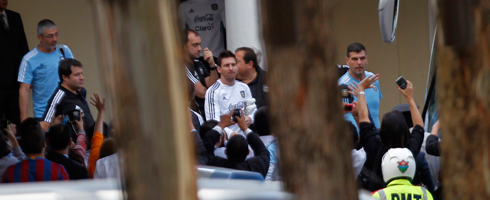Lionel Messi and his father Jorge Horacio are the subject of a lawsuit over unpaid tax bills, allegations that could prove a pivotal moment in both the Argentine international’s professional and private life. If Messi is found guilty then under Spanish law he could face a possible two to six years in prison and a fine of up to six times the amount defrauded, which in the Barca player’s case is an alleged €4m.
However, it is highly unlikely Messi would face a custodial sentence, as the law states that if the amount is over €600,000 then the accused has a period of two months to plead guilty and reach a deal with the prosecution. Otherwise, if the time elapsed exceeds two years and one day, then the player and his father could go to prison despite having no criminal record – right now this seems improbable.
According to El Mundo newspaper, the lawsuit, served by the Attorney General for Economic Crimes in Barcelona, details payments made by 18 multinational companies to the superstar via tax havens such as Belize and Uruguay between 2006 and 2009. It estimates Messi owes €4m in tax through two companies, the first orchestrated by his former agent Rodolfo Schinocca and the other created by his father.
Companies in Spain to have signed up to use Messi’s image rights include Globalia, Danone and Banco de Sabadell, whilst an offshoot of a Spanish multinational, Telefonica Internacional SA Uruguayan U/ Players Image, are reported to have paid him €143,660 in 2008 and €121,670 in 2009. Global giants Adidas, who sponsor Messi, are understood to have paid €1.36m for his image in 2007, €1.23m in 2008 and €1.36m in 2009 – a total of almost €4m spread over three years, Adidas having agreed to pay El Pulga €9m for six seasons.
Messi also received €633,634 from Konami, developer of the Pro Evolution Soccer video game, over two seasons, with two Pepsi-Cola subsidiaries, based in Ireland and the United States according to the lawsuit, paying €103,319 in 2007, €121,303 in 2008 and €122,667 in 2009. In addition, Messi billed Procter and Gamble €125,389 in 2008, while there were other image rights deals arranged in the Middle East, specifically with Kuwait Food and the Aspire Academy for Sports Excellence in Qatar.
More firms to have signed alleged agreements are PV Events from Great Britain, Peruvian concern Carvajal and Colombian businesses El Cid and Bico Products.
Messi is not the first footballer to have become embroiled in a tax row over the thorny question of image rights, with Luis Figo ordered by the Supreme Court to pay more than €2m for attempted evasion a year ago. Furthermore, former Barcelona player Samuel Eto’o also has a court decision pending, having been accused of allegedly defrauding €3.5m between 2006 and 2009.
Xabi Alonso and Javier Mascherano are others to have had the finger pointed at them after allegations on a Portuguese television programme that funds had been diverted through a company based in Madeira. However, perhaps the most famous case is that of Diego Maradona, who recently travelled to Naples to try to find a solution to accusations that claimed he owed an alleged €24m.
What is clear is that in Messi’s case, Barcelona will be hoping the matter is dealt with speedily, either one way or the other, so that the player can concentrate solely on football before the start of the 2013-14 campaign.

